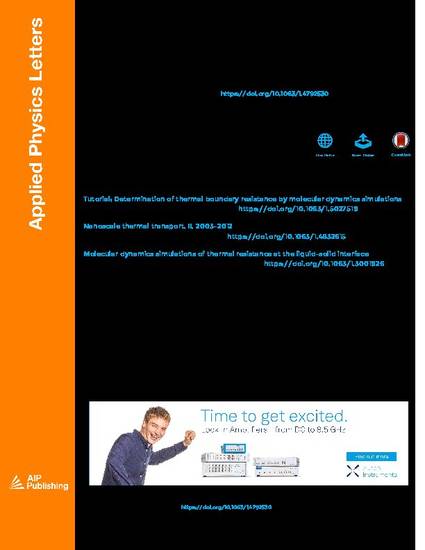
Article
Improvement of Heat Transfer Efficiency at Solid-Gas Interfaces by Self-Assembled Monolayers
Applied Physics Letters
Abstract
Using Molecular Dynamics Simulations, We Demonstrate that the Efficiency of Heat Exchange between a Solid and a Gas Can Be Maximized by Functionalizing Solid Surface with Organic Self-Assembled Monolayers (SAMs). We Observe that for Bare Metal Surfaces, the Thermal Accommodation Coefficient (TAC) Strongly Depends on the Solid-Gas Interaction Strength. for Metal Surfaces Modified with Organic SAMs, the TAC is Close to its Theoretical Maximum and is Essentially Independent from the SAM-Gas Interaction Strength. the Analysis of the Simulation Results Indicates that Softer and Lighter SAMs, Compared to the Bare Metal Surfaces, Are Responsible for the Greatly Enhanced TAC. © 2013 American Institute of Physics.
Department(s)
Mechanical and Aerospace Engineering
Document Type
Article - Journal
Document Version
Final Version
File Type
text
Language(s)
English
Rights
© 2023 American Institute of Physics, All rights reserved.
Publication Date
2-11-2013
Publication Date
11 Feb 2013
Disciplines
Citation Information
Zhi Liang, William Evans, Tapan Desai and Pawel Keblinski. "Improvement of Heat Transfer Efficiency at Solid-Gas Interfaces by Self-Assembled Monolayers" Applied Physics Letters Vol. 102 Iss. 6 (2013) ISSN: 0003-6951 Available at: http://works.bepress.com/zhi-liang/27/

Air Force Office of Scientific Research, Grant FA9550-12-1-0351